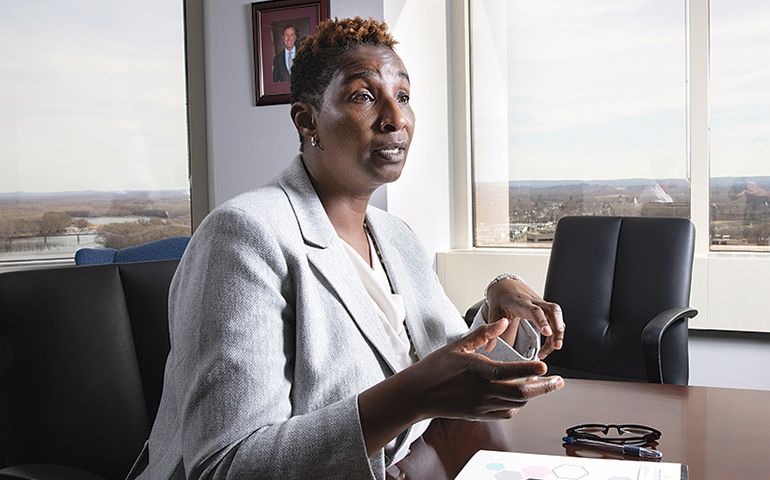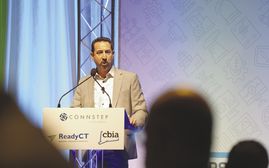
Processing Your Payment
Please do not leave this page until complete. This can take a few moments.
-
News
-
Editions
-
- Lists
-
Viewpoints
-
HBJ Events
-
Event Info
- 2024 Economic Outlook Webinar Presented by: NBT Bank
- Best Places to Work in Connecticut 2024
- Top 25 Women In Business Awards 2024
- Connecticut's Family Business Awards 2024
- What's Your Story? A Small Business Giveaway 2024 Presented By: Torrington Savings Bank
- 40 Under Forty Awards 2024
- C-Suite and Lifetime Achievement Awards 2024
- Connecticut's Health Care Heroes Awards 2024
-
-
Business Calendar
-
Custom Content
- News
-
Editions
View Digital Editions
Biweekly Issues
- April 29, 2024
- April 15, 2024
- April 1, 2024
- March 18, 2024
- March 4, 2024
- February 19, 2024
- February 5, 2024
- January 22, 2024
- January 8, 2024
- + More
Special Editions
- Lists
- Viewpoints
-
HBJ Events
Event Info
- View all Events
- 2024 Economic Outlook Webinar Presented by: NBT Bank
- Best Places to Work in Connecticut 2024
- Top 25 Women In Business Awards 2024
- Connecticut's Family Business Awards 2024
- What's Your Story? A Small Business Giveaway 2024 Presented By: Torrington Savings Bank
- 40 Under Forty Awards 2024
- C-Suite and Lifetime Achievement Awards 2024
- Connecticut's Health Care Heroes Awards 2024
Award Honorees
- Business Calendar
- Custom Content
As COVID-19 outbreak ravages economy, Barton Reeves plots course to launch CT’s paid-leave program
 HBJ Photo | Steve Laschever
Andrea Barton Reeves, CEO of the Connecticut Paid Family and Medical Leave Insurance Authority.
HBJ Photo | Steve Laschever
Andrea Barton Reeves, CEO of the Connecticut Paid Family and Medical Leave Insurance Authority.
The COVID-19 pandemic, which threatens significant human disruption and suffering in the months to come, has rendered millions of Americans unable to work due to illness, quarantine, or other reasons.
For Andrea Barton Reeves, it’s been a shock how quickly the coronavirus has spread and become an economic threat, and, like anyone, she’s concerned about the human toll it could take.
But Barton Reeves must also view the coronavirus through another lens: What potential future outbreaks could mean for Connecticut’s new paid family and medical leave program, which will launch over the next two years.
“If you have a huge influx of people [applying for benefits], it would probably require more resources, and those resources may have to come from other places,” said Barton Reeves, a former nonprofit executive and attorney who in early March assumed her new role as CEO of the state’s Paid Family and Medical Leave Insurance Authority, which will oversee the program. “Now that we’ve seen it’s possible, it’s something to really think about.”

She’s got her eye on what impacts COVID-19 has on the fledgling paid family and medical leave program in Washington — a state with dozens of deaths and hundreds infected — and how officials there respond or adjust.
With some already questioning the design and future solvency of Connecticut’s paid-leave program several years before it pays out its first dollar, accounting for a potential pandemic adds an additional layer of uncertainty.
There’s no shortage of other issues Barton Reeves and her quasi-public board must tackle this year and next as they seek to ensure a smooth rollout of the mandatory employee-funded insurance program, which will allow eligible workers at Connecticut companies of any size up to three months of paid leave per year, with job protections, to treat an illness or care for a sick family member.
Barring any changes, employees on leave will receive 95% of their average weekly pay, capped at no more than 60 times the state’s hourly minimum wage. When the program launches in early 2021, a $12 minimum wage will mean a maximum weekly benefit of $720.
That will rise over the subsequent years, reaching $900 per week in mid-2023, when the hourly minimum wage reaches $15.
Employees will pay for the program through a 0.5% payroll tax that starts Jan. 1, 2021. Worker benefits won’t kick in until the following year.
The program was a top priority for Gov. Ned Lamont, despite pushback from employers.
The medical-leave authority expects to receive bids this week from technology vendors vying to build the program’s contribution system, which will collect and remit to a trust fund, payroll tax contributions from an estimated 1.5 million workers to pay for the program’s benefits and operating expenses.
The authority’s 15-member board — led by chairman Josh Geballe, a former software executive who is currently Lamont’s chief operating officer — will also hire a media and marketing firm to begin promoting the program.
In addition, Barton Reeves is just beginning to staff up. She expects to hire by this summer up to eight authority employees for legal, IT, finance, marketing and administrative jobs. Claims-processing staff and other hires will come later, as the Jan. 2022 benefits launch nears.
“We have an accelerated time frame that we need to meet, and that means a lot of work needs to be done in a very short period of time, and I am up to that challenge,” said Barton Reeves, who was previously CEO of Hartford-based intellectual-disabilities nonprofit HARC Inc. “It’s really about identifying the right people who could help me with that, staffing as quickly as I can with people who are able to hit the ground running.”
Seeing it from both sides
Barton Reeves knows plenty about managing a workforce, and has direct experience reshuffling roles to cover for employees who are out on extended leaves.
At HARC, she was in charge of 400 full-time and part-time mostly lower-wage workers.
The nonprofit worked as best it could, she said, to provide leave to employees who needed it. But those arrangements were on a case-by-case basis, and tended to favor those with longer tenures.
Sometimes it worked out, while other times employees had to fend for themselves.
“Although we had a fairly generous policy, there was still never enough paid time off if you had an extended leave,” she said.
The experience taught her about the logistical challenges that medical leave can create for an employer, but it also left her with the belief that a broad paid-leave program would benefit workers and level the playing field across industries and income levels.
“It relieves a lot of the stress and pressure of figuring out how you’re going to live your life week to week when you have a lot of responsibilities that don’t go away,” she said. “Across the board, there will be a time in everyone’s life when they’ll need to balance life’s challenges, whether they’re joyous or unexpected, with the ability to work everyday.”
Barton Reeves approaches her new role with those experiences in mind, she said.
She views her primary charge as administering the paid-leave program as it’s laid out in state statute, but she’s also an advocate of its value.
In the spotlight
As the medical-leave authority’s work ramps up under its new leader, many are watching closely.
The Connecticut Business & Industry Association (CBIA), the largest business lobby in the state, unsuccessfully fought to block the program last year, and has continued to lobby for tweaks to the new law, such as an exemption for small businesses.
Currently, the law will impact employers with one or more workers, making it a broad-based program.
CBIA and others are concerned about the difficulties employers will face finding the right talent to replace workers on extended leaves, handling additional administrative burdens to comply with the new law, and whether the 0.5% payroll tax will be enough to cover what are viewed as relatively generous benefits and eligibility criteria compared to other states.
There still has not been an actuarial analysis of the program Connecticut adopted, but the Institute for Women’s Policy Research has modeled several different benefit structures, which is how the legislature selected a 0.5% payroll deduction.
The ballpark estimate is that the program will raise approximately $400 million from workers each year to pay for benefits and expenses.
CBIA said it generally doubts the state’s ability to stand up big new entitlement programs that could instead be handled by the private sector. (The paid leave law does set up a process for private insurers to offer their own paid-leave plans to employers so long as the benefit levels are equal to or better than the state’s version.)

CBIA lobbyist Eric Gjede points to the recent collapse and subsequent reorganization of the state’s fledgling Retirement Security Authority, which was supposed to offer retirement-savings products to Connecticut workers but faced multiple delays in launching before it ran out of operating funds late last year.
“The sheer enormity and complexity of this paid-leave program makes it an even more daunting task,” Gjede said.
Barton Reeves is well aware of CBIA’s concerns, and said her board will closely study financial projections when they come in over the next year or so. She reiterated that the law allows the authority to recalibrate benefit levels to ensure solvency.
“I understand those concerns, I really do,” Barton Reeves said. “But as we sit here today, it’s the law of the land, so it’s really my responsibility to execute the law as it’s currently written.”
She said it will be vital to have clear and open communication with employers and workers.
Gjede said he is encouraged by Barton Reeves’ mix of professional experience.
“She is going to be familiar with the struggle that so many of Connecticut’s small businesses deal with on a day-to-day basis,” he said.
Related Content

2022 Giving Guide
This special edition informs and connects businesses with nonprofit organizations that are aligned with what they care about. Each nonprofit profile provides a crisp snapshot of the organization’s mission, goals, area of service, giving and volunteer opportunities and board leadership.
Learn more
Subscribe
Hartford Business Journal provides the top coverage of news, trends, data, politics and personalities of the area’s business community. Get the news and information you need from the award-winning writers at HBJ. Don’t miss out - subscribe today.
Subscribe
2024 Book of Lists
Delivering Vital Marketplace Content and Context to Senior Decision Makers Throughout Greater Hartford and the State ... All Year Long!
Read Here-
2022 Giving Guide
This special edition informs and connects businesses with nonprofit organizations that are aligned with what they care about. Each nonprofit profile provides a crisp snapshot of the organization’s mission, goals, area of service, giving and volunteer opportunities and board leadership.
-
Subscribe
Hartford Business Journal provides the top coverage of news, trends, data, politics and personalities of the area’s business community. Get the news and information you need from the award-winning writers at HBJ. Don’t miss out - subscribe today.
-
2024 Book of Lists
Delivering Vital Marketplace Content and Context to Senior Decision Makers Throughout Greater Hartford and the State ... All Year Long!
ABOUT
ADVERTISE
NEW ENGLAND BUSINESS MEDIA SITES
No articles left
Get access now
In order to use this feature, we need some information from you. You can also login or register for a free account.
By clicking submit you are agreeing to our cookie usage and Privacy Policy
Already have an account? Login
Already have an account? Login
Want to create an account? Register
Get access now
In order to use this feature, we need some information from you. You can also login or register for a free account.
By clicking submit you are agreeing to our cookie usage and Privacy Policy
Already have an account? Login
Already have an account? Login
Want to create an account? Register










0 Comments